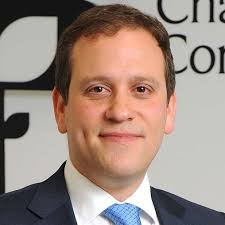The CBI described Rishi Sunak’s first Budget as “bold” in combining the much-needed immediate response to the coronavirus crisis with longer-term measures to boost the economy.
Director-general Dame Carolyn Fairbairn, pictured, said the Chancellor had worked against the clock in deeply challenging times to deliver two Budgets in one – the first for national resilience today and a second for economic ambition tomorrow. 
“It’s a bold Budget at scale, coordinated with the Bank of England, which will help people and business through tough times,” she said.
“As the UK responds to the immediate challenge, people are the first priority. So the measures to expand and ease access to sick pay and benefits are vital to protect people’s health and livelihoods.
“The Chancellor’s actions on business rates, emergency funds and loans will help ensure firms can weather the storm, especially smaller firms. Larger firms may also need support as the situation develops.”
Dame Carolyn said that while the response to Covid19 was urgent, it was very good to see the Budget’s focus on innovation and infrastructure.
“The Chancellor has listened to many calls from CBI members, with decisive action on vital long-term issues.
“The significant uplift in R&D funding, creation of a UK version of ARPA (the US Advanced Research Projects Agency), a fundamental review of business rates and spending promises on infrastructure will all bring real benefits to people, business and communities,” she said.
“The Chancellor has set out some powerful incentives to get businesses investing, increasing the R&D tax credit and the Structures and Buildings Allowance. The £5bn of new export loans will encourage the best of UK business to look to new global markets.”
The next few months would bring opportunities for the government to make major decisions that it had, understandably, had to put to one side, said Dame Carolyn. Some gaps still needed to be filled in around skills, energy efficiency and powering the UK’s low carbon future.
But she added: “Overall, today’s Budget is a powerful signal to firms at home and abroad that the UK can and will manage the immediate challenges and long-term opportunities in parallel.”
Institute of Directors director general Jonathan Geldart, pictured, described it as “a box-office Budget”. 
“Given the circumstances, the Chancellor had to be bold, and he came through for business today,” he said.
“With the coronavirus outbreak threatening a cashflow crunch, measures to cut costs and support loans to businesses are on the money. Wider reliefs around business rates and job taxes will also buoy firms as they look to weather Covid-19’s implications.
“The Chancellor is going ‘all-in’ on infrastructure. Directors have long been crying out for transport and digital upgrades, but this doesn’t mean there can be a blank cheque. The question now is how we translate that money into real improvements for local economies.”
He said directors would welcome the government fleshing out its framework for reaching the ambitious Net Zero target, but the scale of the economic transition was still being sketched out.
“Efforts to ramp up R&D will be crucial to help businesses reset for the long-term challenges ahead. The other key component needed to future-proof our economy, skills, is moving in the right direction but still needs development,” he said.
“The necessary focus on coronavirus does not mean other challenges have gone away. The costs of Brexit adjustment are still very real, but measures to help firms with the difficult task of preparing were notable by their absence.
“Without a genuine implementation period, companies cannot hope to be ready on their own for changes they can’t yet see, particularly with all attention currently on coronavirus.”
He also said pressing on with reforms to IR35, despite the “manifest problems”, would also cause headaches among the business community and, while Entrepreneurs Relief seems to have few friends in the Treasury, it was described by many IoD members as a reasonable reward for entrepreneurial risk-taking.
British Chambers of Commerce (BCC) director general Dr Adam Marshall, pictured, said there was much to welcome for businesses in the Budget but thought the Chancellor could have done more to support them in challenging times. 
“The Chancellor has listened to our calls for support to help firms overcome cashflow challenges posed by coronavirus.
“Increases to infrastructure spending and sharper investment incentives will help businesses grow over the longer-term.
“The Budget has addressed the immediate challenges facing the economy, but the Chancellor will have to do more to support businesses as they navigate changes to trading arrangements and the end of the Brexit transition period.”
The BCC’s head of economics Suren Thiru welcomed the coronavirus business interruption loan scheme and the review of business rates, saying: “Accessing finance remains crucial to the lifeblood of a business and so we are pleased that the Chancellor has listened our call to maintain the flow of credit.
“The acid test for the scheme will be whether it is able to get credit flowing to firms who most need it, rather than the usual suspects.
“While short-term business rates relief for many thousands of businesses is to be welcomed, larger firms will have to wait until the autumn for a further review of Britain’s broken business rates system.
“This review must lead to real action to reduce high upfront costs across the board – something we have long campaigned for. Abandoning the goal of fiscal neutrality for the reforms would be an important starting point.”






























